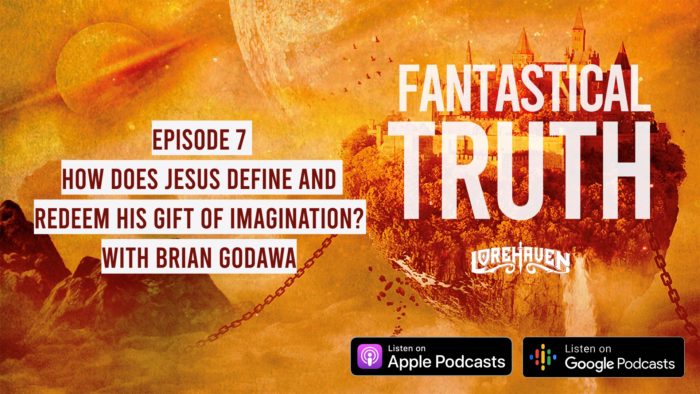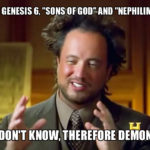Brian Godawa Joins Our Podcast to Contend Rationally for ‘Non-Rational’ Imagination
Behold another Fantastical Truth podcast episode. This one is chock-full of deep-magic goodness about God’s gift of human imagination.1
This time we’re joined by biblical/supernatural novelist and nonfiction author Brian Godawa.
He’s the author of books like his newest fiction Jezebel: Harlot Queen of Israel and his nonfiction The Imagination of God.
Podcast: Play in new window | Download
Here’s an excerpt from our show notes. You can get the full set at the podcast episode page.
We make these topic concessions:
- We can’t go into the entire “graven images” issue here (e.g. what do we do with pictures of Jesus in movies, coloring pages). Another time, perhaps.
- We also can’t address every historical instance of Christians idolizing images.
- We can’t deal with the issue of different personalities. God has gifted some of his people with (colloquially) “left brain” gifts, so they can be engineers or programmers or even theologians skilled in translating/exegeting words. And he’s gifted others with more “right brain” gifts. Side effect of either: hardship understanding the other type of person, or even wrongly judging them.
We explore imagination across the gospel narrative:
- Creation.
- Fall
- Redemption, in old and new Testaments
- Restoration
Next on Fantastical Truth:
This month we’re releasing our next Lorehaven issue. Its cover story explores our favorite Christian-made fantastical novels. This includes that classic of the 1980s, Frank Peretti’s This Present Darkness, a classic (especially for Christians!) supernatural thriller that asks: What If the Armies of Hell Tried to Invade Your Hometown? Lorehaven’s review chief, Austin Gunderson, will join the podcast to explore the Peretti-verse with us.
- Brian Godawa later pointed out that the word irrational in this article’s original title is better replaced with the word non-rational. He comments, “Irrational is of course, against reason, while non-rational can transcend reason without negating it.” ↩








































We certainly do need both logic and imagination. An extension of that idea could be that we need both logic/thought and emotion.
Something I’ve noticed is that, within certain contexts, a good sounding argument can be made for an awful lot of things, whether they’re actually right or wrong. People that solely base their belief system on what seems to have the best argument are a little at risk for constantly getting tossed about by what others think. Like, yes, we should be willing to listen to outside opinions, but we need to have our own foundation to work from as far as our beliefs go, and only change our minds after a long time of deliberate consideration. I was watching a snippet of a debate on YouTube once. It may have been a Christian that was approached/debated on the street by an atheist, though I don’t remember for sure.
Anyway, the Christian was basically saying that she chose her belief system based on the fact that it seemed to have the best argument in her opinion. She didn’t really come off as very secure in what she believed, though. Like, it sounded almost like she was completely willing to drop everything and switch to a different belief system the minute another one sounded better. So in a lot of ways, it didn’t sound like she was coming from a position of strength, as if she didn’t have any true convictions of her own.
And… considering where she seemed to be coming from, she probably does care about a lot of things, but it almost sounds like she DOESN’T because of how amiable she was about changing her mind. If she’s willing to drop any belief the moment a different one sounds more convincing, do any of them really matter? Of course we should be willing to change our minds when there’s valid reasons we’ve thought long and hard about, but that probably shouldn’t be done the minute a nice counter argument comes along.
Hey guys,
I’ve got some general reactions to the podcast. Most by nature reflect things I didn’t quite agree with, because I tend to see things I agree with not needing commentary. Still, I’ll point out some positive things I saw in what you guys had to say, because I don’t want to seem overly critical and there really were some great things about the podcast.
First, I really agree that stories can insert ideas into people without them realizing it, as Zack mentioned using Inception as an example. However, my concern has been quite a lot about the danger of the power of story telling, as I’ve expressed in public statements I’ve made recently have been about the ways our enemy (Satan) uses stories to insert *his* messages into people’s minds.
I was quite concerned in your first podcast how E. Stephen defined Christian fiction as any fiction produced by a Christian. As in, as long as a Christian makes it, it’s good. That isn’t a very sound idea and you guys haven’t really clarified your stance on that so far.
So I really appreciated Brian Godawa spending some time on the notion that there is a real danger in imagination, that stories can contain both good and bad ideas or elements. I would add to that it’s important to point out and confront the bad elements but also to celebrate the good ones. But because ideas or story elements really can be good, therefore there’s some means to observe there are Christians producing art filled with bad ideas, so we cannot uncritically accept all Christian fiction as fiction produced by Christians. (Or alternatively, we can accept it all as Christian fiction, but then we will have to point out some Christian fiction has more negative than positive influences or at least such a thing is possible.)
Also, you guys were collectively a little bit inconsistent about the difference between imagery and words. They are not really that different (“logos” and “eikon” are not opposite ideas). Such concepts of them being opposite are evocative but words don’t even have to paint pictures to be artistic–music especially but also poetry can be artistic based on how it sounds, not the imagery. As far as ideas tending to be separated from art, note that the Apostle Paul, the supposedly uber-rational guy, has poetry in the Epistles (e.g. Romans 8:35-39 and elsewhere). But you guys made up for it by talking about how God combines both elements in who He is, indicating the two things are not truly enemies by nature.
As for the idea that the best stories aren’t overt about what they believe, that’s debatable. Truth can get in edgewise to a person, through imagination. However, not all stories are equally subtle and it is simply a matter of opinion that the best are never overt. For example, putting opinions of the author in the mouth of (a) character(s) is pretty common and sometimes the opinions are not very subtle. Sometimes, the opinions themselves could be the primary reason a person would read a story, depending on the reader and the opinion. E.g. Robert Heinlein’s The Moon is a Harsh Mistress is far more interesting because of the political ideas expressed by characters overtly in the story than it is in the plot. It’s a matter of opinion that a story like that is inherently worse or more poorly written than a more subtle approach. (I think the problem with the ideas overtly expressed by many Christian writers is not so much they overtly express them, but the ideas themselves are not very interesting, because a bunch of other people have already said the exact same thing.)
But yes, stories can implant ideas without the reader or viewer being aware of the reason why or being fully cognizant of what the story was trying to accomplish. Sometimes that’s a wonderful approach. But if Nathan had only told David the story of the beloved sheep mercilessly killed and never explained it, would the story have meant anything to him? That is, there’s a time when being overt is necessary. Hence why there’s such a thing a non-fiction, which Brian also writes in addition to fiction (good for him!). But even some stories can be more overt–in some contexts, that’s OK.
A few quibbles coming up: Brian at one point mentioned that 20-30 percent of the Bible is propositional discourse and 70 percent is imagery and poetry. Yeah I can see why you’d say that but it’s more than a bit misleading to say so. The accounts of the Bible in books we call historical are not really stories–they are events that really happened and often are told in a style that has nothing to do with creating images, but rather getting across facts. Such as genealogies and lists of family names (or even lists of places, which the Bible has, too). Yeah, there’s imagery to be found in those parts of the Bible, but it is arguably another kind of propositional discourse. And the prophets? They are all about lacing propositional discourse with imagery, the propositions certainly no less important than the images. I’m not sure it is possible to divide the Bible up and get those percentages. But since Brian’s point was that both types of things are part of the Bible, his point stands, even if his numbers probably don’t really work.
Brian also mentioned what I think is a good point about the need to portray sinful reality accurately. But being accurate and being graphic are not really the same thing. The Bible is only rarely graphic with its R-rated content. Mostly it uses matter-of-fact terms like, “they struck the city with the edge of the sword” no further description given. On a handful of occasions the descriptions get graphically gruesome, but the overall approach of the Bible makes it clear a detailed description isn’t required for an accurate portrayal. I thought that would be worth pointing out.
Another Bible point is the mention of the mountain growing after it strikes the feet of the four-part image in Nebuchadnezzar’s dream. Nothing in the Bible indicates the mountain will grow slowly–and it’s growth only comes after the image of the world’s kingdoms are destroyed. So I would say that particular dream is about the Second Coming of Christ and not about the Church now. FYI.
One other Bible point, one that may seem truly trivial, but I think E. Stephen may have mispronounced the name “Bezalel” as something like “Ba’al zalel” though I may have not heard correctly. But anyway.
Yes, you guys were very right to point out a day will come when human imagination will be fully redeemed and will no longer be potentially dangerous. As you said yourselves, that day isn’t here yet. Sadly.
Until then, we need to examine ourselves to see how our motivations line up with what God wants…
Overall, useful and interesting podcast. Thanks for producing and sharing it.
(I’m not as savvy at this as Stephen, so I don’t know how to do the quote block thing.)
“First, I really agree that stories can insert ideas into people without them realizing it, as Zack mentioned using Inception as an example. However, my concern has been quite a lot about the danger of the power of story telling, as I’ve expressed in public statements I’ve made recently have been about the ways our enemy (Satan) uses stories to insert *his* messages into people’s minds.”
No disagreement here. Just a difference of emphasis or focus.
“I was quite concerned in your first podcast how E. Stephen defined Christian fiction as any fiction produced by a Christian. As in, as long as a Christian makes it, it’s good. That isn’t a very sound idea and you guys haven’t really clarified your stance on that so far.”
I think I can safely say on Stephen’s behalf (and my own) that he (and I) don’t believe that just because a Christian wrote something, that it’s automatically good. I’m not on the Lorehaven review team, but it’s my understanding that not every book that is requested for a review will receive one. We all have our own tastes and different ways we assign merit to a book. The point being made (perhaps unclearly) is that if a Christian writes a story, it is automatically (only) a Christian story. Obviously some stories are more or less overt in their themes or reflection of Christianity, though.
It’s also fair to say that some Christian authors do not like their (often general-market) stories to be labeled as “Christian books.” Then there’s the whole debate about whether a book (or movie, or song) itself can be Christian. You and Stephen and I might all come to different conclusions about that, and that’s fine. Which is why, for me, I find it more helpful to think of the concentric circle paradigm in terms of authorial intent.